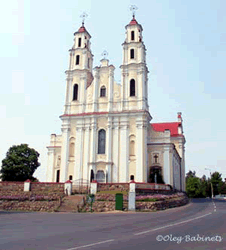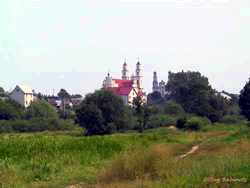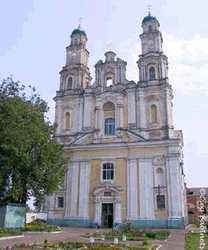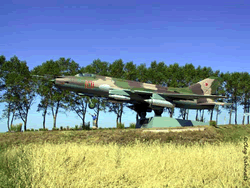#glu-ns1:
Glubokoye town. Roman-Catholic
church of Trinity
(1782)
July 2002
#glu-ns1:
Glubokoye town
In this town in the year 1895 was born world-famous aircraft designer
P.O.Sukhoy (SU aircraf)
July 2002
#glu-ns1:
Glubokoye town. Orthodox
cathedral of the Blessed Virgin
(1654, former church of the barefooted Carmelites order abbey)
July 2002
#glu-ns1:
Glubokoye town.
Monument to the world-famous aircraft designer P.O.Sukhoy,
born in this town in 1895 (SU-17)
July 2002
October 1-8 | Alexander Lukashenko Visits Glubokoye
http://www.president.gov.by/
05.10.2004
The arrival of natural gas to the towns of Glubokoye and Postavy is
another milestone in implementing the strategic project for
gasification of Belarus and the government programme "Clean Fuel." An
additional impetus has been furnished to that region of Belarus — for
developing and resolving many economic and social problems of the
people living there. This is what was said by President of the
Republic of Belarus Alexander Lukashenko on October 5th at the
ceremony for launching natural gas pipelines in Glubokoye and Postavy.
Gasification of that region started upon specific directions from the
Head of State and accomplished ahead of schedule — in three years,
despite quite obvious difficulties. Total expenses equalled 45 billion
rubels.
"Construction and management of gas pipelines, transportation, and gas
supplies are neither easy nor cheap. Gasification, which is important
both for the country and its people, has taken great efforts and
funds. But these expenses can be justified," stressed the President.
By the Victory Day in 2006, just in a year or a year and a half,
high–pressure natural gas pipelines will be laid in Braslav. Gas will
also arrive at Sharkovshchina. More than 70 kilometres of gas pipes
will have to be laid. The work of laying of high–pressure gas
pipelines further southwards — to Begoml and Dokshitsy — will be
carried out in parallel. The residents of those population centres
will get the "blue fuel" by May 2006.
Alexander Lukashenko warmly conversed with the town residents of
Glubokoye and Postavy. There were plenty of people at the gas
launching ceremony, both young and elderly. In Postavy, one of the
town's pensioners presented to the President a Belarusian landscape
picture which she herself had embroidered.
Site of the President of the Republic of Belarus.
www.president.gov.by
Press Service of the President of the Republic of Belarus
The winner of local parliamentary campaign is mr.Chrol, a person who
has already been a depute of Lukashenko's "parliament". But neither
the newly elected nor the previous one are acknowledged as a
democratic and lawful legislative organ by Western diplomats. Anyway
Chrol hasn't been in opposition and more of that the local authorities
wanted him to be the winner. Chrol has been given all the support
needed to win the ballot. Local BPSM (pro-Lukashenko youth
organization) units were commanded to distribute the leaflets of
Chrol. We have a lot of information about violations during the
campaign and on the elections day.
Still majority of Glubokoye citizens have no telephones at home.
Inhabitants of Glubokoye have been fed with promises about
telephonization for incredibly long time. Chrol himself promised to do
everything possible to build another telephone station. Still there's
no sign of any progress. They say it's doubtful that telephonization
will ever start this year
Glubokoye Hotel
Address: 7 Moskovskaya Str, Glubokoye (Vitebsk reg.)
Phone: (+375 2156) 2-12-71
135 turncoats were recruited in Stalag 319A by Major Blazhevicz with
the help of two camp leaders named Alelekov and Makarenko. This second
unit was dispatched to Gajdow in vicinity of Lublin in south-eastern
Poland. In March of 1943 both units were moved to the Glubokoye area
in Belarus, where they were combined into a single larger unit that
became known as the "SS Druzhina Brigade" (a somewhat mis-leading
designation as this was a purely SD formation with no association with
the SS proper).
It is worth noting that in February of 1943 the Germans selected a
group of 50 of these Russian renegades and send them on a trip to
Germany. This trip proved to be counter-productive as the Russians
learned from their fellow countrymen held at the Oranienburg
Concentration Camp (north of Berlin), as well as from Russian slave
workers, of the brutal treatment they endured at the hands of the
Germans. As a result of what they learrned during the trip, many of
the 50 Russians began to question the very logic of collaborating with
the Germans. These doubts about the genuine intentions of the Germans
helped give rise to a patriotic anti-Nazi cell within the SD brigade.
This cell was led by Gil-Radionov and Blazhevicz; the latter managed
to establish secret contacts with the Soviet intelligence during
several journeys to Latvia.
During May of 1943 the SD brigade participated alongside German units
in a major anti-partisan operation. There were no problems with the
fighting abilities of the brigade, and not a single defection was
reported. The Germans began to intensively indoctrinate the Russian
SD-men with "Russian Nationalism" and with the idea that they form a
nucleus of a future "Russian liberation army". After being reinforced
with some additional Russian volunteers, the brigade increased in
strength to 3 000 men.
Since Gil-Radionov concluded that Zhilenkov is an unrepentant
Vlasovite and Nazi collaborator, he removed him from the position of
brigade commander and made him a commander of a 300-strong training
unit. The local SD headquarters decided that this training unit be
assigned to the Northern High Command of Operation Zeppelin in Pskov,
under the command of SS Major Otto Kraus. Kraus decided to transform
this training unit into a regular military detachment, what he
proceeded to do. As a result of his decisions, the First Guard Brigade
of ROA was created; it was as a matter of fact the very first real ROA
unit, and as such it was also the very first Russian military
collaborationist formation to maintain regular contacts with Vlasov.
The First Guard Brigade of ROA was garrisoned in the small town of
Stremutka, about nine miles from Pskov.
On 22 June, 1943, the Germans celebrated the second anniversary of
their invasion of the Soviet Union. To mark this occasion a military
parade was organized in Pskov. To the shock and disbelief of the
Russian on-lookers, the German military parade was opened by a company
of the First Guard Brigade of ROA. Among the Russian on-lookers
present at the parade were also honorary guests like Zhilenkov,
Kromiadi, and Boyarski. The Russian traitors were celebrating the
invasion and rape of their own country!
By August, 1943, Gil-Radionov was so fed up with all the German
atrocities committed on his fellow compatriots that he arranged a
meeting between his representative Major General Bogdanov (and his
chief of intelligence) and the Zhelezniak Partisan Brigade. The Soviet
partisans conducted the negotiations with the permission of the Soviet
government. No agreement was reached however, as Bogdanov was too
timid to desert, and requested only an "armstice" that would extend to
the Germans as well! Afterwards the partisans promised Gil-Radionov
that no retribution will be undertaken against all those Russian
SD-men who decide to join them, provided that they will go over with
all their weapons, join in the struggle against the Germans, and
hand-over Bogdanov and a certain emigre captain named Count Mirski.
Gil-Radionov decided to agree to these terms.
On 13 August, 1943, the mis-named "SS Druzhina Brigade" was encircled
by the partisans. Gil-Radionov and other members of the patriotic cell
proceeded to persuade their Russian comrades to join the partisans,
but unfortunetly many of the brigade's officers, aided by the German
SD liaison team that was permanently assigned to the brigade,
attempted to kill the patriots. In the ensuing struggle the entire SD
liaison team, along with many hard-core Russian collaborators, was
wiped-out. Subsequently, much of the brigade joined the partisans and
proceeded to occupy the Krulevshczina Railway Station; thus, the
important railway line connecting Pskov with Polotsk was severed.
Glubokoye was also attacked, but this assault was repelled. The
freedom fighters decided to abondone the siege and retreated into the
forests.
Only about 30 Russian SD officers and 500 enlisted men remained in the
German service following this incident. The defectors were transformed
into the Soviet First Anti-Fascist Brigade, and Gil-Radionov was
awarded by Stalin the Order of the Red Star. The brigade went on to
fight numerous engagements against the Axis, some of which involved
fighting what remained of the "SS Druzhina Brigade"; both units
suffered heavy casualties in the process. During the winter of
1943-1944 a group of 300 defectors (including Gil) was encircled and
destroyed by Germans and Vlasovites in vicinity of the Zyabki Railway
Station.
Following the mass defection of most of the brigade's personnel, it
became clear that SD lacked sufficient resources and desire to
establish a large "Russian liberation army". The promises made earlier
were simply made to attract high-quality personnel for the Operation
Zeppelin. Kraus was no longer so willing to ressurect the whole
project, while Zhilenkov and his closest associates were relieved of
their duties in the brigade and went back to Berlin. Only Lamsdorff
remained on the First Guard Brigade of the ROA which continued to be
used, albeit only to a limited degree



